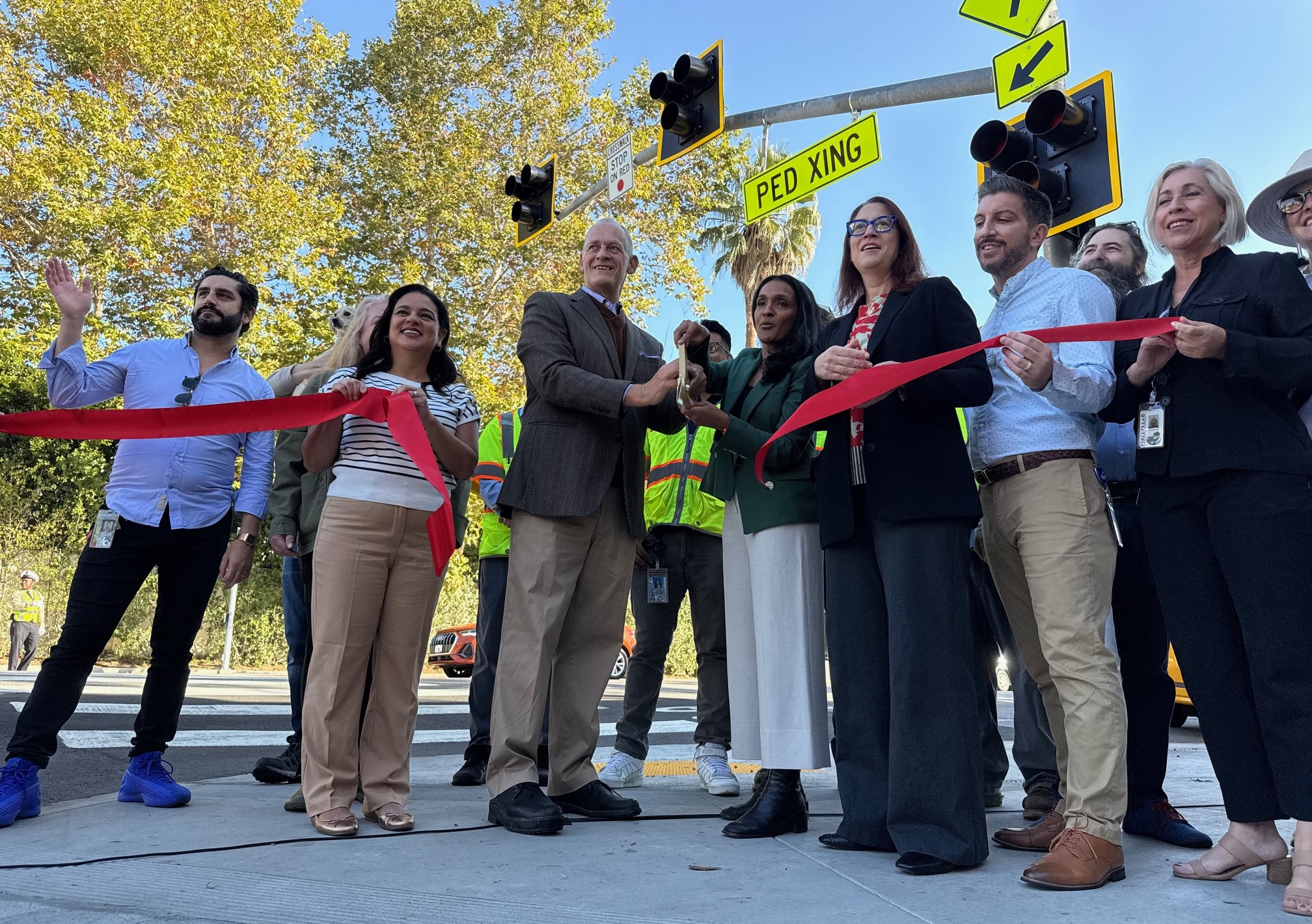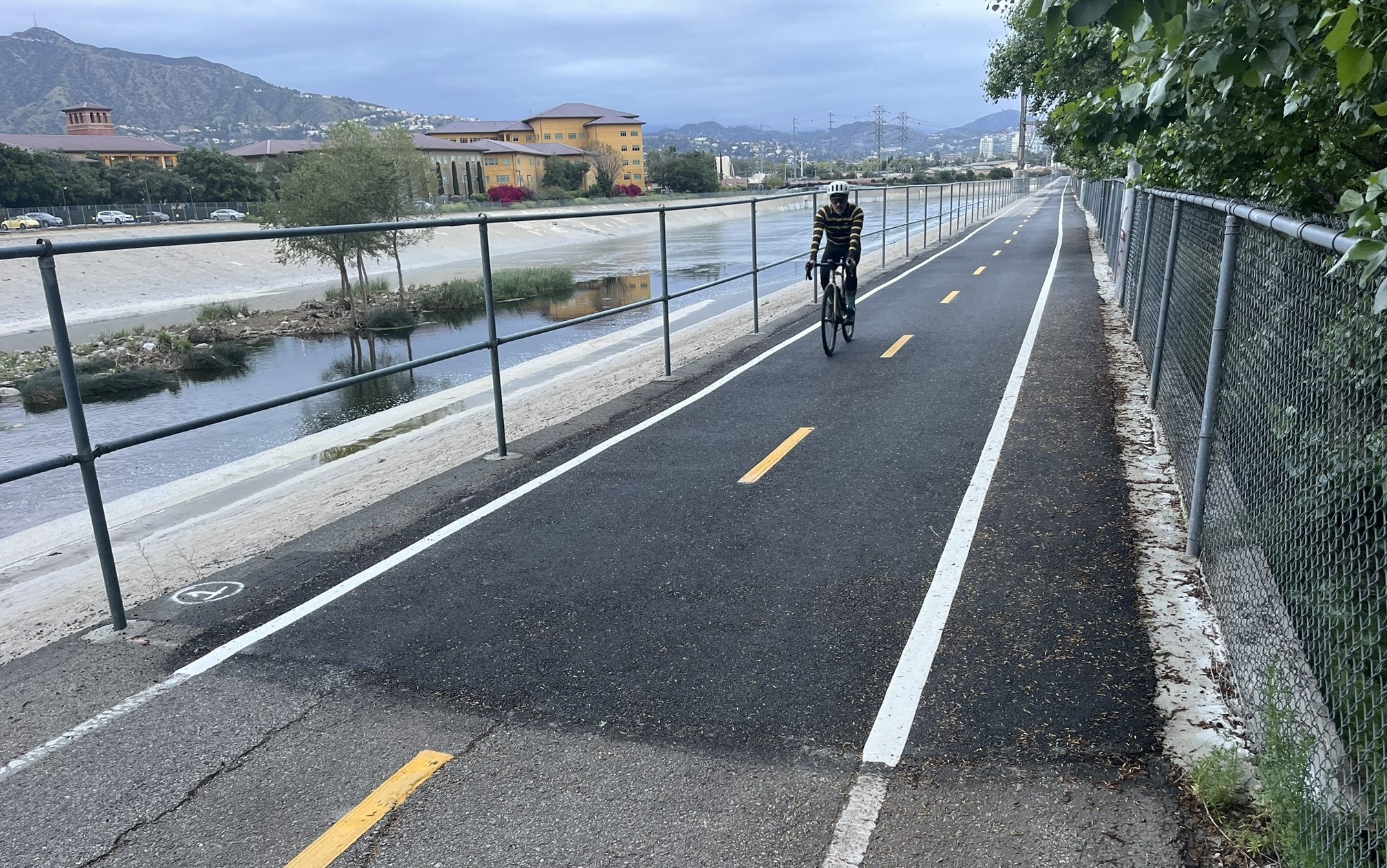 Not from L.A., but don't be surprised if this is the reaction to Congestion Parking. Photo: American Public Media
Not from L.A., but don't be surprised if this is the reaction to Congestion Parking. Photo: American Public MediaLast week, the City of Los Angeles continued modernizing its parking meters by replacing 5,500 on-street parking meters and 7,500 meters in city-owned lots throughout the Downtown. The upgrade was paid for with a chunk of the federal funds being given to the city through Metro as part of the Express Lanes, i.e. congestion pricing, pilot program. By using electronic meters that accept credit-cards, the city can change parking rages by time of day or even based on demand in real time. For the time being, the price will only change by hour and will be increased by as much as 50% over the current flat rate of $4.
These new meters will be able to report file maintenance reports, and combined with the higher prices the city expects to generate an increase in meter revenue from 15-20%, which sadly only amounts to about $1.5 million. If you're interested, you can read a lot more of the technical details at Blogdowntown.
I expected a level of hysteria to accompany the new meter installation and rate increases, but I guess the hysteria is being focused on the city's dastardly plan to make people maintain the sidewalks in front or property they own. Or maybe it's just a delayed reaction. The specter of the city basing its parking costs on demand instead of an artificially reduced rate that makes drivers happy is beginning to make some waves in the media. As you might expect, the reaction isn't jubilation that the city is doing what it can to reduce car congestion, but is instead anger that the city would dare, ya know, charge people money to rent public property to store their personal property.
Reader Carter Rubin points me towards a story on KABC personality Michael Linder's blog that was picked up by LA Observed. Linder is an experienced and decorated journalist, but in this piece he spends his time on the attack and barely does even the most basic research into the impacts of "congestion parking." To be sure, there are plenty of things to criticize about the city's parking plans; a blanket raising of metered rates may not create the most efficient system, as was pointed out by Donald Shoup at the Street Summit, and what about some local return for parking revenue? Studies have shown that backlash from parking increases is reduced if residents can see some improvements as a result. Why you have to look all the way to Pasadena to see an example of how parking fees can change a Downtown (or in that case an Old Town.)
However, as the city inches towards congestion pricing, a path they've been on for years; we can expect most of the criticism to come from the "paying for parking stinks" camp. For now, let's look at Linder's piece.
Parking meter rates jacked up in real time? It willsoon be possible in Los Angeles, making on-street parking soprohibitive some drivers may find themselves tapped out and headinghome, freeing spaces for others willing to pay several dollars more perhour at a meter that charged far less minutes earlier.
Ugh. This is reminiscant of Tim Rutten's fictional poor person that couldn't use an Express Lane to get to the hospital because her rich boss and his friends were using it to get to a golf course. Who goes to Little Tokyo, the Diamond District, or any of the other attractions in the Downtown would change their minds because they have to pay a couple of dollars more in parking?
On-demand pricing is on its way to a parking meter near you.
“It’ll be adjusted to what’s going on in that block,” says LosAngeles Department of Transportation’s Peer Ghent of the city’sExpressPark program now in development. “When the blocks are full, theprice will go up. When blocks are empty, the price will go down.”
Meterswould also charge more for extended parking. “The first hour might be$2, the next hour might be $3,” says Ghent. “That’s to insureshort-term parking.”
This is a neat trick. It makes it sound as though Congestion Parking is on its way post haste. In truth, the city is currently only planning on charging a rate based on time of day, not demand. Which is too bad, because basing it on demand would actually increase efficiency and funds raised.
If one is really worried that parking costs will "drive" people away from the Downtown, then they should be really excited about "congestion parking" or parking rates based on demand. After all, if parking costs were truly causing people to skip the Downtown, then the rates would fall until these theoretical people came back.
Traffic engineers claim up to 90% of traffic congestion is caused bydrivers searching for a place to park. They say their scheme willreduce pollution and greenhouse gas emissions while offering motoristsgreater convenience — though at a greater cost calculated to drive awaythe frugal.
I love the "traffic engineers claim" start to the paragraph. It's as though this number was just invented and that the impact of parking on auto congestion hasn't been studied for decades.
It's also too bad for Linder's piece that there was nobody else we could turn to for an explanation of how low-cost parking leads to congestion...like some sort of "parking rock star." And it's too bad that such a parking expert didn't work just a couple of miles from where Linder is based. It would be really great if this expert could illustrate his explanation with something really easy to understand, such as Matchbox cars.
“Most of the time, there’ll always be one or two spaces available on any given block,” says Ghent.
Which is the goal of congestion parking, that there's almost always an empty space or two on any given block. How you can accomplish that with rate increases based on time of day alone is beyond me, and Shoup has demonstrated that the city doesn't have a great track record in setting prices to meet demand. But this is a laudable goal and one that would reduce congestion as it would increase parking in front of major attractions.
ExpressPark is quickly becoming a reality. Rightnow, 5,500 parking spaces are being readied for a one-year pilotprogram which becomes operational in July, 2011, funded by a federalDOT grant. Street sensors and smart meters are being installed from theGarment District to Chinatown, Civic Center to Little Tokyo, able tosend demand data to computers that can boost meter rates in a heartbeat.
Those 10,000 new solar-powered, credit card-reading parking metersnow being installed citywide will also be capable of plugging intoExpressPark if the downtown experiment is a success.
Good summary of factual data that can be culled from a press release.
City Council, which sets parking fees, has granted LADOT permissionto hike existing downtown meter rates up to 50% for the pilot program,increasing the rate at $4/hour meters to $6 when more cars pack thestreets. The city estimates meter revenues will rise as much as $1.5million during the test run.
But while the feds prohibit LA from using ExpressPark funding as arevenue booster, Council members will have the freedom to set rates attheir whim in 2012 when the grant expires. It’ll be tempting for acash-strapped city: push a button, parking revenues skyrocket.
And here's where the city opens itself to real criticism because all of the funds from its parking policies go into the General Fund, which is viewed by many as a yawning black hole. If the funds went into local projects instead of the general fund it would head off the criticism that the city's right-minded, and progressive, efforts to reform the parking system and reduce congestion is all about the bottom line.






